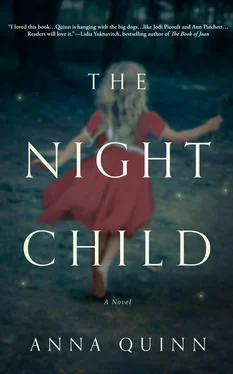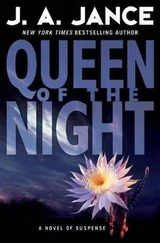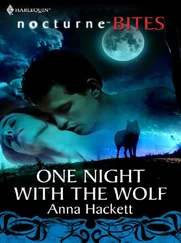“Kind of loud, huh?” David says, looking up, adjusting his glasses so they are balanced evenly across his nose. She folds her hands on her lap and nods her head. He has a strong, handsome face, and a tiny silver ring glimmers from the lobe of his left ear. With his white hair and white beard he looks like a thin, hip Santa Claus.
“Well, you’ve got a clean health report—no medications, no allergies, no past or present disease, hormones balanced, EEG, MRI, blood work, all normal.” He peers at her over his glasses for a moment before he removes them. “So let’s talk. You saw a child’s face, and it spoke to you.” His tone is gentle, nonjudgmental, which of course it would be—psychiatrists are trained for this sort of thing. She’d hoped though, for a bit of surprise from him, some reaction to suggest he knew she was not the type who hears voices.
She flushes a bit and nods. “Yes, a face, but no body.”
He folds over page one and begins reading page two. Without looking up, he says, “And your sleep is worsening; you have nightmares, and you feel unable to cope with everyday things.” He looks at her for confirmation. She nods again.
“Can you tell me more about feeling unable to cope?”
“Well—” she says quietly, “I … just feel so tense all the time. And the smallest thing, things that don’t seem to bother anyone else, make me feel like I want to break something, and lately it seems worse, and I get these strange headaches that no one seems to be able to explain, and—” she is suddenly aware of her quick acceleration of thoughts and stops abruptly. She does not want to fail at appearing normal.
“Do you remember when the first strange headache began?”
She closes her eyes. She remembers when it started—three weeks ago at Fiona’s birthday party.
“Six more days until my birthday!” Fiona announced at breakfast a week before her birthday, holding up six fingers. And then every breakfast after that: “Five more days!” “Four more days!” “Three more days!” “Two more days!” “One more day!” Until finally, she shouted from the top of the stairs, “Today’s the day! Today I’m six years old!”
And what a beautiful day they had. Nora took Fiona and five of her friends (three girls and two boys because Fiona wanted exactly six kids) on the Metro bus to Golden Gardens, their favorite waterfront park because it has the most sand. Paul (he worked Saturdays) planned to meet them for lunch.
Nora sat at a weathered picnic table, the salty air filling her lungs, quickening her senses, and watched the children race up and down the beach in their parkas and little rubber boots. They picked up shells, jumped over tide pools, and dodged waves as they broke upon the beach, their boot prints trailing behind, tiny imprints vanishing in a flash with the next foamy wave.
Her little girl running closest to the waves, fiercely innocent, daring the waves to catch her, and then running away fast, laughing and shouting, “You can’t get me! You can’t get me!”
When had this happened? When had the milky-breathed infant who sucked hungrily at her breast grown up enough to dare the ocean? Where was the toddler with the chubby legs who waddled about the house, feeding Oreos to her stuffed animals and holding books upside down, pretending to read?
It was then, in this delicious, bittersweet musing, that the headache began to pound.
“Nora? Nora, did you hear me? Do you remember when the headaches started?”
“It was Fiona’s—my daughter’s—birthday party. Three weeks ago. Her sixth birthday.” Her mouth is dry, and it’s hard to swallow.
“Did you enjoy the party?”
“Yes. Yes, it was wonderful.” Despite her headache, the day had been perfect. Paul had arrived in time for lunch, and Fiona was thrilled at the sight of him. She’d laughed hysterically with her friends as he sang a solo of “Happy Birthday” in a low, rumbling voice and gave her six big kisses, three on each cheek. In that moment, Nora’s heart had brimmed. Sitting at a picnic table, in this little circle of love with her husband and six children, all with purple lips from the cupcakes—this is how it was supposed to be.
“Six years old. A sweet age,” David says.
Nora’s eyes well up, and she wants to be home. She wants to decorate the house for Christmas. It’s Saturday morning and she should be home making hot chocolate for Fiona instead of here in this stale room pushing the edges of her mind to god knows where.
“This has to be hard, feeling so tired while trying to be a good mother and teacher at the same time,” he says.
His kindness unnerves her. She presses her back deeper into the couch, presses her knees together with her folded hands between her thighs.
“Nora, before this—before the headaches, nightmares, and hallucinations—how did you feel?”
She shrugs. “Fine, I guess.” And she does think that. Mostly. But then, there’s that small, weighted part of her that feels like she’s lying, the part that fires an adrenaline rush through her every time someone asks how she is.
“Were you happy?”
She is caught off guard, flustered. The question is so personal. She flushes more deeply, stares at her folded hands.
He looks at the page and up again. “And you rate your marriage a three out of ten?”
“Yes,” she says, her face burning now. “It’s just that … I don’t know.” She stops speaking. It all feels too intimate to tell a stranger, and besides, she’s here to talk about the face.
David folds his hands on her pile of forms. “Hmmm,” he says finally. “So you have a lot of stress.”
She pulls a pillow onto her lap, a beige canvas one with a huge bird on it—a black raven made from felt stitched on with red thread. She likes ravens, she relates to their preference for privacy.
“Stress can trigger hallucinations.”
“And make you crazy?” She traces the raven with her finger.
“I know you’re frightened, but using words like that doesn’t help, only scares you. We’ll need to have many conversations before I can even make a diagnosis—”
She closes her eyes. Continues to trace the raven. Wants to throw it in the air and see if it will fly. “Christ,” she says.
“Listen, I’m sure you’ve heard about experiments on sleep deprivation, how it significantly decreases normal functioning—can cause depression, anxiety, reduce cognitive ability …”
She opens her eyes and stops tracing the raven. She stares at him.
“A lack of sleep can cause personality distortions. Even just forty-eight hours can do that. After three days people have been known to hallucinate.”
“What are the chances I’m not crazy?” She hears herself asking this question and can hardly bear that at this point in her life, this is where she is, on this couch, with this pillow, asking this question.
“Again, please stop using that word. I’ll be a broken record if I need to be.”
She crosses and recrosses her legs. She doesn’t want to offend him. “Sorry,” she says.
He leans forward, fixes his eyes on hers. “I become concerned when a person loses the ability to interpret hallucinations or voices as a problem. You seem very clear that something is wrong. Whether it’s chemical or emotional is for us to find out. And let me be clear with you. There are many in the medical field who are quick to label something like this a disorder, who are quick to prescribe medication, and well, I believe it’s worth looking at other things first—factors outside of our immediate awareness—thoughts, feelings, experiences that influence us, many of which we are not conscious of. Obviously, I’m here to help you explore those factors in a safe environment. I’m not saying I won’t prescribe medication—I will if I feel it’s necessary—but there’s a lot more to be done before we make that decision.”
Читать дальше












